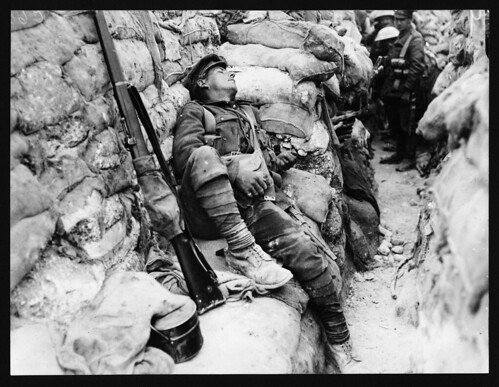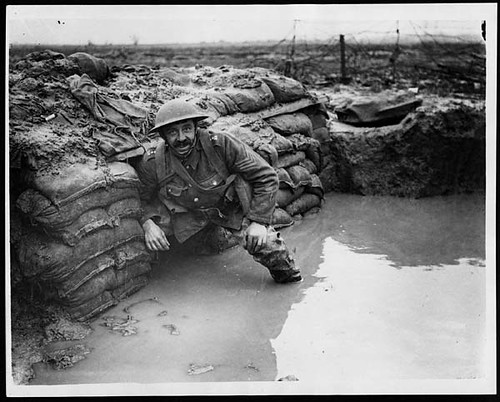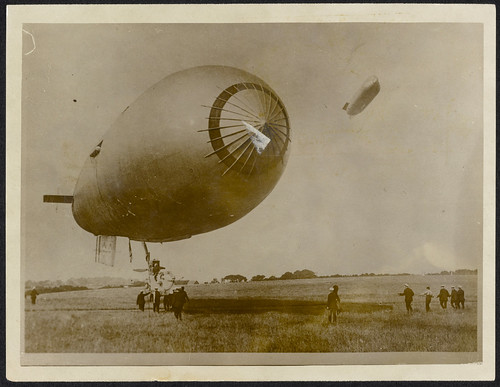| |
|
 |
| Wild Eye , the Souvenir King |
by National Media Museum on Flickr |
|
World War I (WWI), which was predominantly called the World War or the Great War from its occurrence until 1939, and the First World War or World War I thereafter, was a major war centered in Europe that began on 28 July 1914 and lasted until 11 November 1918. It involved all the world's great powers, which were assembled in two opposing alliances: the Allies (centered around the Triple Entente of the United Kingdom, France and Russia) and the Central Powers (originally centered around the Triple Alliance of Germany, Austria-Hungary and Italy).
|
 |
| Soldier's comrades watching him as he sleeps, Thievpal, France, during World War I |
by National Library of Scotland on Flickr |
|
These alliances both reorganised (Italy fought for the Allies), and expanded as more nations entered the war. Ultimately more than 70 million military personnel, including 60 million Europeans, were mobilized in one of the largest wars in history. More than 9 million combatants were killed, largely because of great technological advances in firepower without corresponding advances in mobility. It was the sixth deadliest conflict in world history, subsequently paving the way for various political changes such as revolutions in the nations involved
|
 |
| Some shell cases on the roadside in the front area, the contents of which have been despatched over into the German lines |
by National Library of Scotland on Flickr |
|
Long-term causes of the war included the imperialistic foreign policies of the great powers of Europe, including the German Empire, the Austro-Hungarian Empire, the Ottoman Empire, the Russian Empire, the British Empire, France, and Italy. The assassination on 28 June 1914 of Archduke Franz Ferdinand of Austria, the heir to the throne of Austria-Hungary, by a Yugoslav nationalist was the proximate trigger of the war. It resulted in a Habsburg ultimatum against the Kingdom of Serbia. Several alliances formed over the previous decades were invoked, so within weeks the major powers were at war; via their colonies, the conflict soon spread around the world.
|
 |
| Leven in een loopgraaf |
by Nationaal Archief on Flickr |
|
By the war's end, four major imperial powers—the German, Russian, Austro-Hungarian and Ottoman empires—had been militarily and politically defeated and ceased to exist. The successor states of the former two lost a great amount of territory, while the latter two were dismantled entirely. The map of central Europe was redrawn into several smaller states. The League of Nations was formed in the hope of preventing another such conflict. The European nationalism spawned by the war and the breakup of empires, the repercussions of Germany's defeat and problems with the Treaty of Versailles are generally agreed to be factors contributing to World War II.
|
 |
| War game-Bow of SEATTLE at full speed (LOC) |
by The Library of Congress on Flickr |
|
|
 |
| Moving big guns up to the front by hand |
by National Library of Scotland on Flickr |
|
|
 |
| Stacks of food, etc. |
by National Library of Scotland on Flickr |
|
|
 |
| After the Marne fighting (1914-1916) |
by Nationaal Archief on Flickr |
|
The Schlieffen Plan was the German General Staff's early 20th century overall strategic plan for victory in a possible future war in which the German Empire might find itself fighting on two fronts: France to the west and Russia to the east.
|
 |
| Flooded dug-out in front line trench |
by National Library of Scotland on Flickr |
|
The plan took advantage of expected differences in the three countries' speed in preparing for war. In short, it was the German plan to avoid a two-front war by concentrating troops in the west and quickly defeating the French and then, if necessary, rushing those troops by rail to the east to face the Russians before they had time to mobilize fully. The Schlieffen Plan was created by Count Alfred von Schlieffen and modified by Helmuth von Moltke the Younger after Schlieffen's retirement; it was Moltke who actually implemented the plan at the outset of World War I. In modified form, it was executed to near victory in the first month of the war. |
 |
| BRITISH NAVY IN WARTIME |
by Nationaal Archief on Flickr |
|
However, the modifications to the original plan, a French counterattack on the outskirts of Paris (the Battle of the Marne), and surprisingly speedy Russian offensives ended the German offensive and resulted in years of trench warfare. The plan has been the subject of intense debate among historians and military scholars ever since. Schlieffen's last words were "remember to keep the right flank strong," which was significant in that Moltke strengthened the left flank in his modification.
|
 |
| Officer leads the way amidst the bursting of German shells |
by National Library of Scotland on Flickr |
|
|
 |
| THE BRITISH WESTERN FRONT IN FRANCE. THE GERMAN OFFENSIVE. |
by Nationaal Archief on Flickr |
|
|











